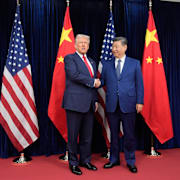
Kina anklagar USA för cyberattacker mot myndighet
Kina anklagar USA för cyberattacker mot landets myndighet för tidmätning, rapporterar Bloomberg.
Landets säkerhetsdepartement skriver på den kinesiska sociala medieplattformen Wechat att den amerikanska underrättelsetjänsten NSA via dolda servrar globalt har utnyttjat sårbarheter i anställdas mobiler och stulna inloggningsuppgifter sedan 2022 för att hämta känslig information, enligt nyhetsbyrån.
Anklagelserna kommer efter upprepade påståenden från västerländska regeringar och företag de senaste åren om att kinesiska hackare ligger bakom attacker mot deras datasystem.
Läs mer om Kinas säkerhetsdepartement
Wikipedia (en)
The Ministry of State Security (MSS) is the principal civilian intelligence and security service of the People's Republic of China, responsible for foreign intelligence, counterintelligence, and political security of the Chinese Communist Party (CCP). One of the largest and most secretive intelligence organizations in the world, it maintains powerful semi-autonomous branches at the provincial, city, municipality and township levels throughout China. The ministry's headquarters, Yidongyuan, is a large compound in Beijing's Haidian district.
The origins of the MSS date to the beginnings of the CCP's Central Special Branch, replaced by the Central Committee Society Department from 1936 through the proclamation of the People's Republic in 1949. In 1955, the department was replaced with the Central Committee Investigation Department, which existed in various configurations through the Cultural Revolution to 1983, when it was merged with counterintelligence elements of the Ministry of Public Security (MPS) to form the MSS.
An executive department of the State Council, the contemporary MSS is an all-source intelligence organization with a broad mandate and expansive authorities to undertake global campaigns of espionage and covert action on the so-called "hidden front." Within China, the ministry leverages extrajudicial law enforcement authorities to achieve its domestic objectives: the State Security Police serve as a secret police authorized to detain and interrogate people in what is known as an "invitation to tea." Those remanded by state security are detained in the ministry's own detention facilities.
Outside the mainland, the ministry is best known for its numerous advanced persistent threat groups, some outsourced to contractors, which carry out prolific industrial and cyber espionage campaigns. The ministry has also been implicated in political and transnational repression and harassment of dissidents abroad. Its influence operations, carried out with the United Front Work Department in accordance with the "three warfares" doctrine, have produced some of the country's most pervasive diplomatic rhetoric including "great changes unseen in a century" and "China's peaceful rise."
Once rarely acknowledged, in recent years the ministry has drastically increased its profile. While its inner workings remain opaque, propaganda posters about national security branded with the ministry's seal are now a common sight in Chinese cities, and the ministry's WeChat posts receive millions of views. Estimates of the ministry's size range from 110,000 to 800,000 employees, with most of the workforce spread between the dozens of semi-autonomous bureaus across the country.
Omni är politiskt obundna och oberoende. Vi strävar efter att ge fler perspektiv på nyheterna. Har du frågor eller synpunkter kring vår rapportering? Kontakta redaktionen



